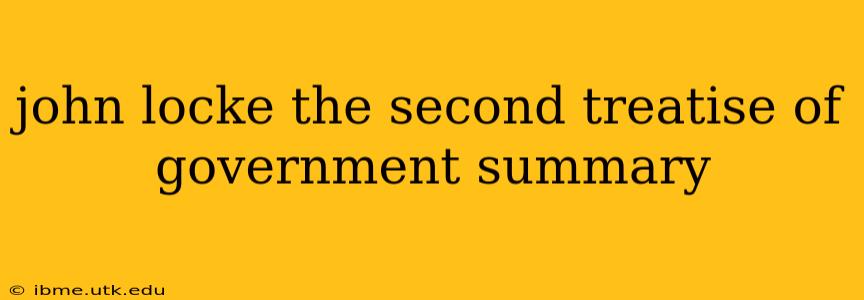John Locke's Second Treatise of Government, published anonymously in 1689, is a cornerstone of liberal political philosophy. It profoundly influenced the development of Western political thought, particularly the American Revolution and the Enlightenment. This treatise argues for a government based on natural rights, popular sovereignty, and the right to revolution, shaping our understanding of individual liberty and the social contract.
The State of Nature and Natural Law
Locke begins by outlining his concept of the "state of nature," a hypothetical condition preceding the establishment of government. This isn't a chaotic free-for-all, as some might assume. Instead, Locke posits that even without government, individuals are governed by natural law. This natural law dictates that all people possess inherent rights, including the right to life, liberty, and property. Crucially, Locke argues that these rights are inalienable; they cannot be legitimately taken away.
What are the key differences between Locke's and Hobbes's views of the state of nature? This is a frequently asked question. While both philosophers address the state of nature, their perspectives differ dramatically. Hobbes viewed the state of nature as a "war of all against all," driven by self-interest and a constant fear of death. Locke, however, believed the state of nature is governed by reason and natural law, allowing for cooperation and social interaction. The primary difference stems from their differing views of human nature. Hobbes saw humans as inherently selfish, while Locke believed humans are capable of reason and cooperation.
The Social Contract and the Purpose of Government
To better secure their natural rights, individuals enter into a social contract, agreeing to form a government. This government's primary purpose is to protect these rights. Locke emphasizes the importance of limited government, arguing against absolute monarchy. He advocates for a government with clearly defined powers, constrained by law, and accountable to the people. He believed that individuals retain certain rights even after entering the social contract, which the government cannot infringe upon.
What are Locke's arguments for the right to revolution? This is another central question explored in the Second Treatise. Locke argues that if a government consistently violates the natural rights of its citizens, or fails to uphold its end of the social contract, the people have the right to alter or abolish it. This right to revolution is not taken lightly; it's a last resort when all other avenues for redress have been exhausted. However, it underscores the fundamental principle of popular sovereignty: ultimate political authority resides in the people.
Property Rights and the Basis of Liberty
Locke dedicates considerable attention to property rights, arguing that they are fundamental to individual liberty. He believed that individuals acquire property through their labor—mixing their work with natural resources. This concept of property extends beyond mere physical possessions; it includes the right to one's own body, mind, and the fruits of one's labor.
How does Locke justify the accumulation of property? This is a complex question within Locke’s philosophy. He does acknowledge the potential for inequality in the accumulation of property, but justifies it based on the idea that individuals have a right to improve their own lives and accumulate wealth through their efforts. However, he also implies limitations—the "enough and as good" proviso suggests that individuals should not accumulate so much property that it prevents others from acquiring their own sufficient share.
Influence and Legacy
Locke's Second Treatise of Government had a profound and lasting influence on political thought and practice. Its emphasis on individual rights, limited government, and popular sovereignty laid the groundwork for many modern democratic systems. The American Declaration of Independence, for instance, explicitly reflects Locke's ideas about natural rights and the right to revolution. His work continues to be studied and debated, offering valuable insights into the relationship between government and the individual. Understanding his arguments is crucial for comprehending the evolution of Western political thought and the ongoing debates about liberty, justice, and the role of the state.
